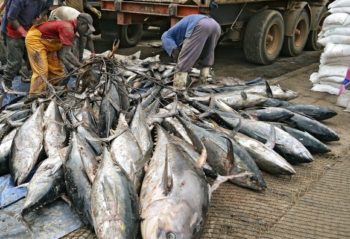
With a coastline of about 850 km that borders the Atlantic Ocean in the Gulf of Guinea, Nigeria is undoubtedly and divinely endowed with the resources for exploit in the maritime industry. The aquatic splendour that characterises our nation’s topography naturally provides a befitting environment for a booming fish trawling industry. With a population that is close to 200million, experts have suggested that Nigeria will need an average of 3.2million metric tons of fish yearly to feed its ever-increasing population, which again provides a good market for fish business. The sad irony is that the local supply cannot meet local demand for fish, needless to talk about exporting to get some foreign earnings.
In the 70s and 80s, the fish trawling industry in Nigeria was a major employer of labour with significant contribution to the Gross Domestic Product (GDP) of the country. The federal government even had to set up the Nigerian National Fish Company to operate deep-sea fishing fleet. But all that has now become lessons from history. An industry that once had over 300 licensed fish trawling companies employing a sizable number of the nation’s youths is now practically moribund. Reports have it that there are currently less than ten trawling companies in the country. As a result we now depend on importation of fish when we have all that is required locally to meet our fish demands. The Executive Secretary, Agricultural Research Council of Nigeria, ARCN, Prof. Baba Abubakar once stated that Nigeria spends N97 billion on fish importation annually, money that we willingly give away to create jobs in other nations.
The Fishing Trawlers Owners Association of Nigeria listed some of the challenges facing the industry to include inconsistent government policies, and the porousity of Nigerian waterways. The biggest challenge facing the fish trawling industry in Nigeria is pirate activities and armed robbery at sea. Piracy has become a menace on Nigerian waterways posing a major challenge for every maritime related business in the country. It is sad that whilst maritime business in the country is experiencing a decline, piracy and armed robbery are gaining more grounds. What is now obvious is the inability of the current security strategy to protect Nigerian investors that conduct business on the sea. This calls for an urgent review of our waterways security strategy in the interest of the nation. The private individuals cannot provide security for their business on the sea, only the government can do this.
Legally, the “Sea Fisheries (Fishing) Regulations and the “Sea Fisheries (Licensing) Regulations” are the two laws that seek to regulate the fishing and trawling business in Nigeria. The Sea Fisheries (Licensing) Regulations forbids any unlicensed vessel from trawling on Nigerian waters. However, contrary to the dictates of this law, observers have suggested that some strange, foreign, and unlicensed ships come into the country’s waters to trawl without any form of questioning from relevant authorities, which presupposes a connivance of some sort at the expense of local operators. The current situation demands intervention of the government. The private sector in any industry cannot deliver to its fullest without an enabling environment, which is the responsibility of the government.
Additionally, there is also need for deliberate and concerted effort to maximise our natural endowments for the growth and development of the Nigerian economy. The benefits in the trawling industry suggest that the country should have a trawling policy direction that enables the activities of trawlers. There seems to be a complete absence of support from the government for local trawlers. Deprived of government’s support, trawlers are like orphans without protection. The business requires maximum support from the government. There are currently all manners of incentives such as tax exemptions and grants for investors in different sectors of the economy. These incentives can also be extended to trawlers in the country to grow the trawling industry in Nigeria. There is a huge market for consumption locally that will support the industry. In the same way, there is a wide market for the trawling business outside the country. All that is required is for us to put our acts together as a nation. If we seek to truly diversify the economy and make agriculture the mainstay of our economy, the trawling industry holds much prospects in that regard.
Also, the government needs to pay more attention to the Nigerian Institute for Oceanography & Marine Research. One of the mandates of the institute is to ensure “effective and sustainable management of fisheries resources through improved post-harvest preservation, utilization and storage using profitable technological processes.” Adequate funding for the institute will aid quality research that can be deployed for the growth and development of the industry. There is a bounty of blessings awaiting this country only if we can tap into the endless opportunities in the maritime and ocean space. These opportunities have the capacity to employ thousands of our youths and grow our economy. But first, the government has to recognise the inherent opportunities and make a strategic effort to tap into them.